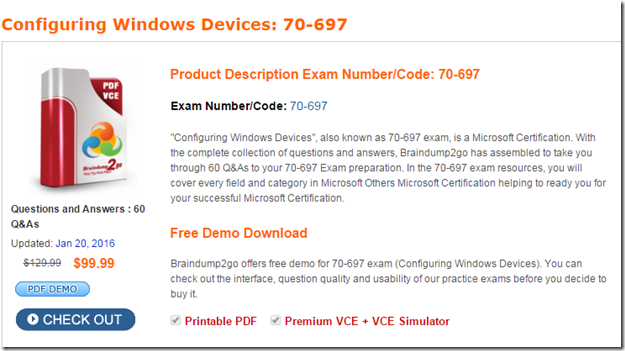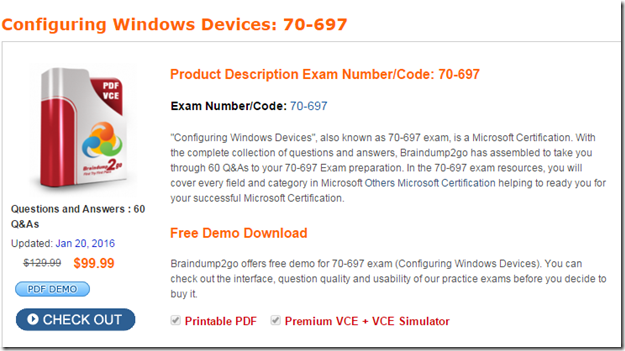MICROSOFT NEW EXAM RELEASED TODAY: 70-697 Exam Questions has been RELEASED Today By Braindump2go! Get Latest 70-697 VCE and 70-697 PDF Instantly! Welcome to Download the Newest Braindump2go 70-697 VCE&70-697 PDF Dumps: http://www.braindump2go.com/70-697.html (60 Q&As)
Exam Code: 70-697
Exam Name: Configuring Windows Devices
Certification Provider: Microsoft
70-697 Dumps,70-697 Exam Questions,70-697 PDF,70-697 VCE,70-697 Braindumps,70-697 Study Guide,70-697 Books,70-697 eBook,70-697 Practice Exam,70-697 Practice Test,70-697 Configuring Windows Devices

QUESTION 1
You administer a Windows 10 Enterprise computer that runs Hyper-V.
The computer hosts a virtual machine with multiple snapshots.
The virtual machine uses one virtual CPU and 512 MB of RAM.
You discover that the virtual machine pauses automatically and displays the state as paused-critical.
You need to identify the component that is causing the error.
Which component should you identify?
A. no virtual switch defined
B. insufficient memory
C. insufficient hard disk space
D. insufficient number of virtual processors
Answer: C
Explanation:
In this question, the VM has “multiple snapshots” which would use up a lot of disk space. Virtual machines will go into the “Paused-Critical” state in Hyper-V if the free space on the drive that contains the snapshots goes below 200MB.
One thing that often trips people up is if they have their virtual hard disks configured on one drive – but have left their snapshot files stored on the system drive. Once a virtual machine snapshot has been taken – the base virtual hard disk stops expanding and the snapshot file stores new data that is written to the disk – so it is critical that there is enough space in the snapshot storage location.
Incorrect Answers:
A: No virtual switch being defined would not cause the Pause-Critical state.
B: Insufficient memory would not cause the Pause-Critical state.
D: An insufficient number of virtual processors would not cause the Pause-Critical state.
http://blogs.msdn.com/b/virtual_pc_guy/archive/2009/04/22/why-is-my-virtual-machine-paused-critical-hyper-v.aspx
QUESTION 2
You have a Microsoft Intune subscription.
You have three security groups named Security1, Security2 and Security3.
Security1 is the parent group of Security2. Security2 has 100 users.
You need to change the parent group of Security2 to be Security3.
What should you do first?
A. Edit the properties of Security1.
B. Edit the properties of Security2.
C. Delete security2.
D. Remove all users from Security2.
Answer: C
Explanation:
You cannot change the parent group of a security group in Microsoft Intune.
You can only delete the group and recreate another group with the correct parent.
Deleting a group does not delete the users that belong to that group.
Therefore, you do not need to remove the users from the group; you can just delete the group and recreate it.
Incorrect Answers:
A: You cannot change the parent of a group by modifying the properties of the parent group.
B: You cannot change the parent of a group by modifying the properties of the group.
D: Deleting a group does not delete the users that belong to that group. Therefore, you do not need to remove the users from the group; you can just delete the group and recreate it.
https://technet.microsoft.com/en-gb/library/dn646990.aspx
QUESTION 3
A company has 10 portable client computers that run Windows 10 Enterprise.
The portable client computers have the network connections described in the following table.

None of the computers can discover other computers or devices, regardless of which connection they use.
You need to configure the connections so that the computers can discover other computers or devices only while connected to the CorpWired or CorpWifi connections.
What should you do on the client computers?
A. For the CorpWifi connection, select Yes, turn on sharing and connect to devices.
B. Turn on network discovery for the Public profile.
C. Change the CorpWired connection to public.
Turn on network discovery for the Public profile.
For the HotSpot connection, select No, don’t turn on sharing or connect to devices.
D. For the CorpWired connection, select Yes, turn on sharing and connect to devices.
E. Turn on network discovery for the Private profile.
Answer: C
Explanation:
Of the answers given, this is the only single answer that meets the requirements.
Network discovery is a network setting that affects whether your computer can see (find) other computers and devices on the network and whether other computers on the network can see your computer. By default, Windows Firewall blocks network discovery, but you can enable it.
When we change the CorpWired connection to public, all networks will be in the Public profile. Enabling network discovery for the Public profile will enable the computers to see other computers on each network (including HotSpot).
To prevent network discovery on the HotSpot network, we can select No, don’t turn on sharing or connect to devices for that network. This will disable Network discovery for the computer’s connection to the HotSpot network.
Incorrect Answers:
A: This solution would enable network discovery for the CorpWifi network, but not the CorpWired network.
B: This solution would enable network discovery for the CorpWifi and HotSpot networks, but not the CorpWired network.
D: This solution would enable network discovery for the CorpWired network, but not the CorpWifi network.
E: This solution would enable network discovery for the CorpWired network, but not the CorpWifi network.
QUESTION 4
Hotspot Question
Your company upgrades a research and development department workstation to a Windows 10 Enterprise computer. Two of the workstation’s folders need to be encrypted. The folders are named C:\ProtectedFiles and C:\Backups.
You attempt to encrypt the folders. The output is shown in the following exhibit.

Use the drop-down menus to select the answer choice that completes each statement.
NOTE: Each correct selection is worth one point.

Answer:

Explanation:
We can see from the image below that all files and the ProtectedFiles folder were encrypted successfully (There are no errors and there is an [OK] message for each action).

The image below shows that the folder was encrypted successfully (Setting the directory Backups to encrypt new files [OK]).
The file Backup.zip failed to encrypt because the file is read only. The other file, OldBackup.zip was encrypted successfully.

https://technet.microsoft.com/en-us/library/bb490878.aspx
QUESTION 5
You have a computer named Computer1 that runs Windows 10 Enterprise.
You add a 1 TB hard drive and create a new volume that has the drive letter D.
You need to limit the amount of space that each user can consume on D: to 200 GB. Members of the Administrators group should have no limit.
Which three actions should you perform? Each correct answer presents part of the solution.
A. Run fsutil quota violations D:.
B. Enable the Deny disk space to users exceeding quota limit setting.
C. Enable the Enable Quota Management setting.
D. Set a default quota limit.
E. Run convert D: /FS:NTFS.
F. Add a quota entry.
Answer: BCD
Explanation:
To limit the amount of space that each user can consume, you should enable the Enable Quota Management setting, and then enter the appropriate values in the Limit Disk Space To text box and the Set Warning Level To text box, and then select the Deny Disk Space To Users Exceeding Quota Limit check box to enforce identical quota limits for all users.
Incorrect Answers:
A: The fsutil quota violations D: command will search the system and application logs and display a message to indicate that quota violations have been detected or that a user has reached a quota threshold or quota limit. It will not, however, set the quota limit.
E: The convert D: /FS:NTFS command will convert the volume to NTFS. It will not set the quota limit.
F: A default quota entry exists for administrators so answer F is not required.
https://technet.microsoft.com/en-us/library/dd277427.aspx
https://technet.microsoft.com/en-us/library/cc788136.aspx
https://technet.microsoft.com/en-us/library/bb490885.aspx
QUESTION 6
Drag and Drop Question
You have a computer that runs Windows 10 Enterprise that contains the following folders:

You have a local user named User1. User1 has read and execute permission to Folder1.
You need to ensure that User1 can perform the following tasks.
– Create new files in Folder2.
– Edit all files in Folder3.
– Change the permissions of files in Folder5.
The solution must use the principle of least privilege.
Which permissions should you assign to User1 on each folder? To answer, drag the appropriate permissions to the correct folders. Each permission may be used once, more than once, or not at all. You may need to drag the split bar between panes or scroll to view content.

Answer:

Explanation:
Advanced permissions are detailed permissions that are grouped together to create the standard permissions. The permissions in this question are standard permissions. Folder2: To create new files in a folder, you need Write permission to the folder. The `Write’ standard permission includes the `Create files / write data’ advanced permission. Folder3: To edit existing files in a folder, you need Modify permission. Folder5: To change the permissions of files in a folder, you need the `Change Permissions’ advanced permission. The Change Permission advanced permission is in the `Full Control’ standard permission group. Therefore, the answer for Folder5 is Full Control.
http://windows.microsoft.com/en-gb/windows/before-applying-permissions-file-folder#1TC=windows-7
NEW MICROSOFT EXAMS RELEASED: NEW UPDATED 70-697 PDF Dumps &70-697 VCE Dumps from Braindump2go: http://www.braindump2go.com/70-697.html (60 Q&As)





